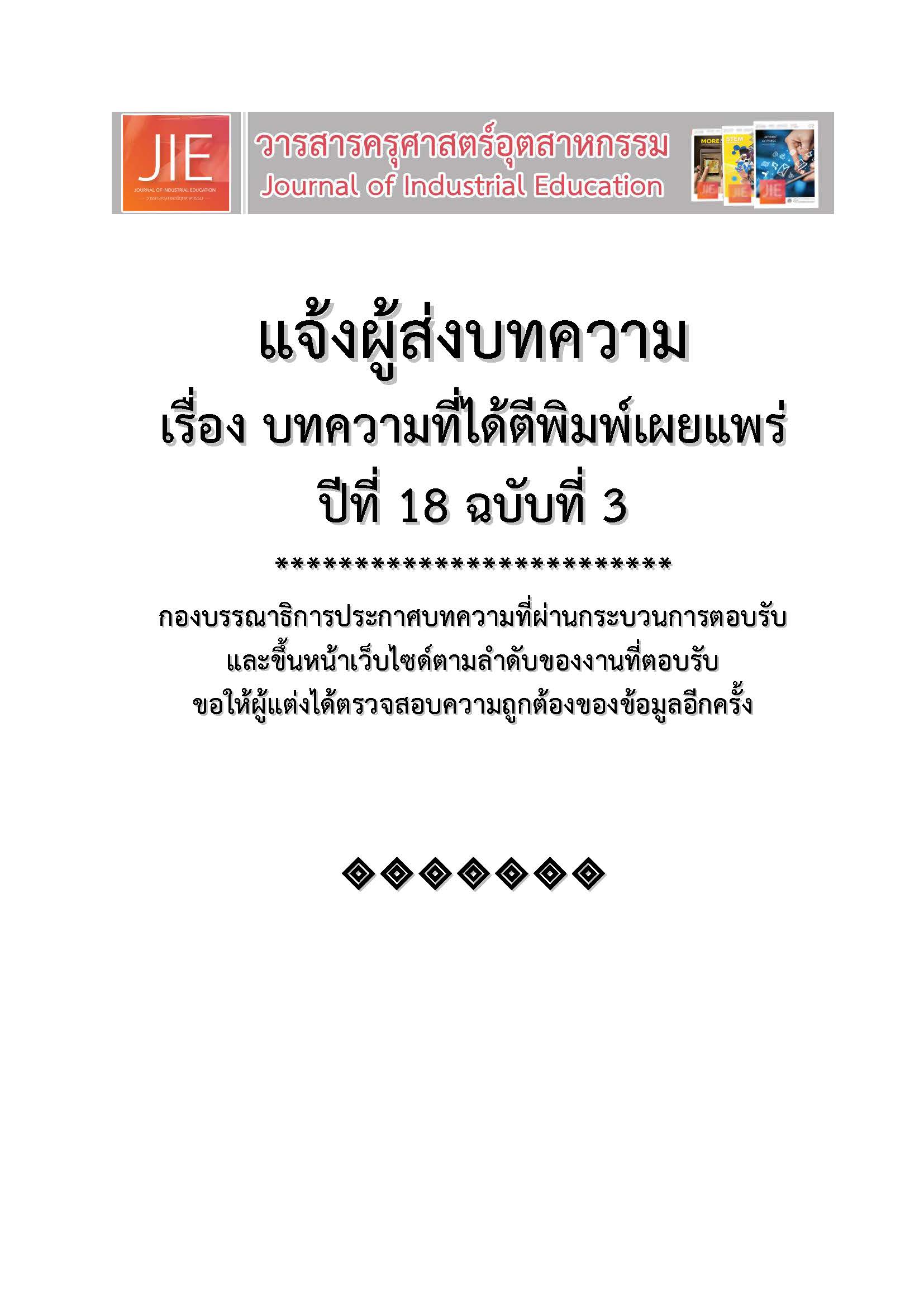THE PSYCHOMOTOR ACHIEVEMENT OF FLIPPED CLASSROOM WITH E-LEARNING ON MACHANIC ELECTRIC AND ELECTRONIC
Keywords:
E-learning, Flipped classroom, The courseware for the tenth-grade studentsAbstract
The objectives of this research were to study the psychomotor achievement of flipped classroom with e-learning on mechanic electric and electronic and electronic. The samples of the study comprised grade 10 students at Nawamintrachinutid Bodindacha selected by the Cluster Random Sampling method. The Research Methodology is 1) develop flipped classroom using e-learning plans 2) develop e-learning on mechanic electric and electronic and 3) study the psychomotor achievement of flipped classroom with e-learning on mechanic electric and electronic and electronic. The research instrument included flipped classroom using e-learning plans, e-learning on mechanic electric and electronic, quality evaluation form for the instruction plan, quality evaluation form for the e-learning and psychomotor achievement test consisting of a question for execution test on the theory and practice that has average of difficulty index equal 0.33 and average of discriminate index equal 0.28. The statistics used in the data analysis included arithmetic mean, standard deviation and t–test One-sample test for the mean. The results of this research revealed that the quality of the flipped classroom with e-learning lesson plans on mechanic electric and electronic was at an excellent level (= 4.54), the quality of e-learning was at an excellent level (
= 4.61) and the efficiency of e-learning was at 90.16/93.43, the psychomotor achievement of students after learning with flipped classroom concepted using e-learning was found to be higher than criteria that school expected a statistically significant level of .05.
References
Wachirapan Thongvijit. 2016. INTERNET OF THINGS (IOT). Retrieved June 15,2018, from http://oho.ipst.ac.th/internet-of-things/
Department of National Education Act B.E..2010. National Education Act B.E. 2542. Retrieved June 8,2018, from https://person.mwit.ac.th/01-Statutes/NationalEducation.pdf
Department of development learning Huachiew Chalermprakiet University. 2017. Flipped Classroom Instruction. Retrieved July 27,2018, from https://www.hcu.ac.th/upload/files/2560/Flipped%20Classroom.pdf
Santi vijakkhaluk. 2018. E-Learning in the present. Retrieved July 18,2018 From https://edoffice.kku.ac.th/research/files/108670-5-2-eLearning-santi-ed-journal-47.doc p.7-8.
Arporn Jaitiang. 2010. theory of teaching. Bangkok: Odean store.
Jonathan Bergmann and Aaron Sams. 2011. Flip YOUR Classroom Reach Every Student in Every Class Every Day. Eugene, OR: International Society for Technology in Education.
Nattakorn Songkram. 2014. MULTIMEDIA FOR LEANING: DESIGN & DEVELOPMENT. 3rd ed. Bangkok : Chulalongkorn university.
Pairoaj Tiranathanakul, Phaiboon Kiatkomol, & Sakesan Yampinitch. 2011. Techniques for Producing Self-learning Lessons for Distance Learning on the Internet. Bangkok: Bangkok Supplementary Media Center.
Chaiyong Promwong. 2013. Developmental Testing of Media and Instructional Package. Retrieved May 28,2018 From http://www.educ.su.ac.th/2013/images/stories/081957-02.pdf p.7-19.
Lon Sayyot. 1997. Statistic for research. Bangkok: Suwiriyasan.
Wannakarn Boonyok. 2018. The development of learning using flipped classroom to enhance learning achievement on presentation using computer software. Master of Science, King Mongkut's Institute of Technology Ladkrabang.
Puttiwan Chuangpitak.2017. Development of flipped classroom with active learning via e-learning in presenting information using technology for high school. Master of Science, King Mongkut's Institute of Technology Ladkrabang.
Nawaphat kemkaman. 2015. The effect of flipped classroom instruction with e-learning courseware on achievement of Information Technology II subject for grade 10 students. Master of Science, King Mongkut's Institute of Technology Ladkrabang.
Downloads
Published
How to Cite
Issue
Section
License
"The opinions and contents including the words in papers are responsibility by the authors."
"ข้อคิดเห็น เนื้อหา รวมทั้งการใช้ภาษาในบทความถือเป็นความรับผิดชอบของผู้เขียน"



